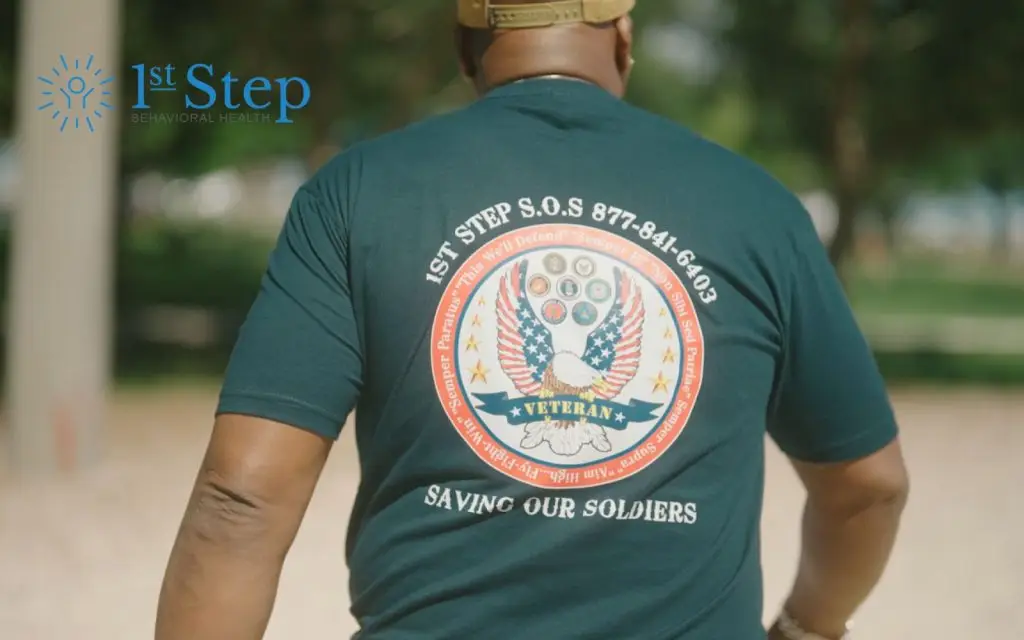Active duty military personnel face unique stressors and challenges that can increase the risk of substance use disorder (SUD). Active duty service members often require specialized treatment programs to address SUD and mental health conditions.
This article will explore the treatment options available for active-duty military members. You will learn:
- What factors can increase the risk of SUD in military personnel
- What types of treatment are available for active-duty military personnel
- Where military personnel can go to find treatment and support
- Where to find rehab for military personnel
If you or a loved one serving in the military requires addiction treatment, you are not alone. Contact the intake team at First Step Behavioral Health to explore our Veteran’s treatment programs or to schedule an intake appointment.
Understanding the Connection Between Military Service and Substance Abuse
Our nation’s active duty military personnel and veterans dedicate themselves to service to the country. Many of them face unique challenges related to their service that increase the risk of drug or alcohol abuse.
Here are some of the factors behind the connection between military service and substance abuse.
Pain
Military service, including training, combat, and other duties, can lead to injuries and pain. Many military service members live with chronic pain or the lasting effects of injuries related to their service.
Military members who take prescription opioids to manage pain are at higher risk of developing an addiction. Some may also use drugs or alcohol to cope with their pain. Self-medicating pain with illicit drugs can lead to severe problems, including addiction.
Post-traumatic stress disorder (PTSD)
Many military personnel and veterans experience intense, ongoing stress during many aspects of their service. Training, being away from family, combat, and reintegration challenges can lead to chronic stress. People may also develop post-traumatic stress disorder (PTSD) related to their time in service.
Living with post-traumatic stress disorder can increase a person’s risk of developing substance use disorder (SUD). People with PTSD may use drugs or alcohol to cope with the symptoms of PTSD, which can include:
- Flashbacks (re-living the traumatic experience)
- Nightmares
- Feeling “on-guard” all the time
- Sleep issues
- Mood swings or angry outbursts
- Feeling emotionally numb
- Avoiding people, places, objects, and situations related to the traumatic event
People with PTSD and SUD require evidence-based treatment programs and specialized ongoing support.
Mental health challenges
Living with a mental health disorder may increase the risk of developing SUD. Some active duty military personnel and veterans may have a “tough it out” mindset. However, not seeking treatment for mental health conditions can lead to serious complications, including a higher risk of developing addiction.
Military members and veterans may not know what resources are available or how to access them. Contact the Department of Veterans Affairs (VA) or First Step Behavioral Health to learn more about available programs, treatment centers, and relapse prevention support.
What Addiction Treatment is Available for Military Service Members?
Military rehab centers provide tailored services designed to help military service members and veterans overcome substance use disorder. Addiction recovery is not a one-size-fits-all process. There are many types of programs and levels of care to meet a wide range of needs.
Some of the programs military members and veterans may explore include:
- Medical detox programs
- Mental health treatment programs
- Inpatient or residential addiction treatment programs
- Intensive outpatient programs (IOP)
- Partial hospitalization programs (PHP)
- Dual diagnosis treatment (treatment for co-occurring mental health disorders and SUD)
- Outpatient rehab programs
- Aftercare support (mental health care, medical treatment, screenings, medications, etc.)
Rehab for military personnel provides tailored care to meet our nation’s service members’ unique needs. People may engage in a variety of evidence-based therapies, including:
- Substance abuse and mental health evaluations
- Medically-supported detox (medications, emotional support, and medical supervision during detox)
- Medication management
- Behavioral therapies like cognitive behavioral therapy (CBT) and dialectical behavior therapy (DBT)
- Specialized therapies for trauma, including eye movement desensitization and reprocessing (EMDR)
- Individual, group, and family counseling when appropriate
- Holistic therapies, including nutrition support, mindfulness, and exercise
- Relapse prevention education
- Aftercare planning and support
Participating in a rehab program can help military members regain control over their health and future. Overcoming addiction can be challenging, but getting the proper support can help people work toward long-term recovery.
Where Can Active Duty Military Service Members Find Treatment?
Active duty military service members can find information about drug and alcohol addiction treatment by contacting the VA or contacting their TRICARE representative. They may also reach out to the specialists at First Step Behavioral Health to learn more about our programs.
If you or someone you love lives with substance abuse or addiction, you are not alone. Recovery is possible. Contact the intake specialists at First Step Behavioral Health to verify your insurance or find a treatment program. Reach out with questions or to schedule an intake assessment.

